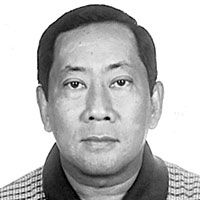DPWH: Contractors must work on the road

For our special presentation on our talkshow on Straight from the Sky, we bring you Prof. Yuko Kobayakawa PhD from the Toyo University, who was looking for me when she saw that I was one of the authors of the coffee table book, “War in Cebu.” During our dinner, she told me that she already had met my co-author Jobers Bersales of the University of San Carlos.
Prof. Yuko told me that one of the articles that you will read in the book War in Cebu features a Japanese immigrant, named Seitaro Kanegae, who arrived in Cebu in 1909 at the age of 16-years old where he gives a brief description of Cebu in the early 1900s. He had a daughter named Shizuko Kanegae who died at the age of 2-years old in Cebu and was buried in a small plot at the old Lorega Cemetery, which has now been demolished. It was her grave that sparked the search for this person and Yuko ended up discovering that Kanegae wrote a book about his life as an immigrant in Cebu. It is a very rare book.
If people want to know what happened during the World War II if Kanegae joined and became an officer of the Japanese Imperial Army? No, he did not, although many Japanese did join the war. Kanegae ran to the hills and eventually went to Manila and was repatriated back to Japan in 1946 where he wrote his book about Cebu City prior to the war.
It is a 700-page book later translated into English and published in Manila in 1987 titled “The Path to Friendship: A Tale of a Japanese Immigrant in the Philippines.” As Jobers Bersales wrote in this Facebook page, “The book by Seitaro Kanegae helps fill the near-empty knowledge about Japanese shopkeepers, owners, gardeners, landscapers, seafarers, fishermen, and carpenters, Nikkei-jins who were part of Cebuano urban society before World War II.
Nikkei-jin is a Japanese term used to refer to any Japanese person who left Japan and settled elsewhere. It is also applied to the descendants of that person. We have added of late another name to this diasporic term by using “Japino” to refer to the children of a Japanese-Filipina marriage.”
So watch this very rare interview with Prof. Yuko Kobayakawa about pre-war Cebu from the eyes of Mr. Kanegae on SkyCable’s channel 61 at 8:00PM tonight with replays on Wednesday and Saturday at the same time slot. We also have replays on MyTV’s channel 30 at 9:00PM tonight with other replays on Wednesday and Friday at 7:00AM and 9:00PM respectively.
***
Last weekend, we went to the fabulous Plantation Bay with our cousin, John and Inda (Manuel) Gage who was in Cebu for a few days visiting friends and relatives. They live in Stamford, Connecticut where we stayed for a week when we went to New York City a year and a half ago.
Traffic going to Mactan was not as bad or should I say “normal” as the repair of the bridge was temporarily stopped. On our way home from 9:30PM, it still took us 50-minutes to get home. But there was no traffic in Mactan but in Mandaue City where I saw the road works along Jose L. Briones St. the continuation of Plaridel St. along the University of the Visayas Mandaue Campus where that night not a soul was working. One backhoe had the name PB Obial Construction painted on its sides, so I can only presume that PB Obial Construction is the contractor for this project.
Again, I would like to emphasize to our friends in the Department of Public Works and Highways that for me, Daang Matuwid should mean, throwing away our old and stupid lazy ways and moving forward faster to progress. But how can we move forward if the DPWH allows PB Obial Construction to bag road projects on Metro’s Cebu’s major streets that link Cebu City to Mactan and yet this construction company does not even work during the weekends or at least 24-hours a day?
When Rep. Luigi Quisumbing appeared as guests for our 888 News Forum, he told us that he gave millions to his district, which includes Mandaue City. Unfortunately, he did not ask the DPWH for vital projects like flyovers that could have eased the traffic in Mandaue City. I also asked him about the delays of the DPWH, which as you already know by now are caused by contractors that do not work during the weekends and night time, which could have resulted in a faster turnover of the project. Clearly, DPWH and their contractors are taking their sweet time to fix that road.
Cebu is no longer the old Cebu that we all used to know. It has become an international city. But alas, we are still very third world when it comes to maintaining and fixing our roads. In the US or Japan, vital works especially on major roadways that are major links to cities are given utmost attention and work is done 24/7 so that the economy will not suffer. We hope that with a new president, he would whip the DPWH to no longer allow contractors to win road projects unless they work 24/7 on the minimum. This should be the hope of Cebuanos to have a president who cares for Cebu.
***
For email responses to this article, write to [email protected] or [email protected]. His columns can be accessed through www.philstar.com.
- Latest























